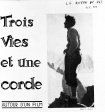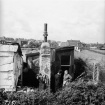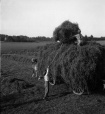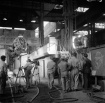Au Carrefour de la vie
| 片名: | Au Carrefour de la vie |
|---|---|
| 其它片名: | 人生的交叉路口/The crossroad of life |
| 导演: | Henri Storck, Luc de Heusch, Georges Lust |
| 编剧: | Luc de Heusch, Stéphane Cordier, George Lust |
| 制片人: | Paul Leleu |
| 摄影: | François Rents, Charles Abel |
| 声音: | Jacques Carrère |
| 剪辑: | Henri Storck |
| 主演: | Jean-Paul, Renée Delnatte, Nadine Bellaigue, Anne-Marie Ferrière |
| 音乐: | Raymond Chevreuille |
| 片长: | 28分钟 |
| 年份: | 1949年 |
| 类型: | 纪录片 |
| 国别: | 比利时 |
| 语言: | |
| 格式: | 35毫米/黑白 |
| 制作机构: | CEP |
影片概述 . . . . . .
什么是犯罪?怎样防止犯罪?人们应当如何对待它?本片通过并行的两名青少年的小故事,对以上问题作出解答。贾斯汀是个私生子,由于遭受母亲和继父虐待而离家出走并沦落为一名小偷,如同特吕佛经典名片《四百击》里面的主人公,是个典型的“安托万”式形象。雅娜,则是个珂赛特和穆榭特的综合体,遭受了一切年轻女孩可能遭遇的不幸:被遗弃、强暴以及被迫卖淫。他们的故事优美而伤感,终以某种意义上的“大团圆结局”收场。最重要的是,由于导演的精湛功力,使演员们举手投足之间,全部融入真实的影片角色中去,而远非生硬的说教。另几个片断里的小女贼,小暴君,以及那个被宠坏了的孩子,一方面与主题遥相呼应,另一方面则更广泛地展现出青少年犯罪所涉及的社会层面。无论从法律还是精神医学的角度来看,本片所给出的社会性答案基本上是正面而积极的。这部半纪录半剧情的影片全部由画外音讲述,人物的内心独白和解释性旁白穿插其中。影片信息量丰富并富有时效性,而首当其冲的,则是两个相当精彩的小故事。
“全部自然实景拍摄(布鲁塞尔法院,精神医疗诊所等),影片的观点通过具体案例进行了充分阐述,即不存在有罪的儿童,只有扭曲和受到创伤的心灵。”
Francis Bolen,《比利时电影的真实历史》,Mémo et Codec出版社,1978年
“录音、音乐、剧本,和旁白都无可挑剔。演员的表演,尤其的小孩子们的演出如此自然以至于让人相信这是一场真实的案件。”
G. Pl,《红旗》(比利时共产党日报),布鲁塞尔,1949年4月29日
...was entirely filmed in natural exteriors and surroundings (the Law Courts in Brussels, a psycho-medical clinic...). The argument of the film, that there are no guilty children, only ill or traumatised ones, is pertinently demonstrated through specific cases."
Francis Bolen, Histoire authentique du cinéma belge, Ed. Mémo et Codec, 1978
"The sound, the music, the script and the commentary are practically faultless. The actors' performances, especially the children's, are very natural, so much so that one can almost believe one is in the presence of true delinquents."
G. Pl., Le Drapeau rouge, Brussels, April 29, 1949
What is delinquency, how can it be prevented, how should one respond to it? These questions were answered in the film by parallel fictions of two adolescents. Justin, a young runaway and thief, an illegitimate child ill-loved by his mother and stepfather, is a perfect role model for the boy Antoine Doinel in 400 coups by Truffaut. Jeanne, a mixture of Cosette and Mouchette, is prey to all the misfortunes of young girls who are abandoned, raped and prostituted. Their stories are beautiful and sad and are concluded by a judicial and institutional happy ending. But above all, they are made moving by remarkable directing that makes them into real film characters and not simply mouthpieces for the good cause. Other mini stories, that of the little robber girl, the violent boy, and the spoilt child bring counterpoints and open the field of delinquency that touches all social levels. The social response, be it judicial or psycho-medical, is analyzed and deemed positive overall. All of this half-fiction, half-documentary film is told in voice over, where the inner monologue of the characters and an explanatory commentary are intermingled. The message is generous and of topical interest, but above all it has concealed within it like treasure, two perfect little tales.
“全部自然实景拍摄(布鲁塞尔法院,精神医疗诊所等),影片的观点通过具体案例进行了充分阐述,即不存在有罪的儿童,只有扭曲和受到创伤的心灵。”
Francis Bolen,《比利时电影的真实历史》,Mémo et Codec出版社,1978年
“录音、音乐、剧本,和旁白都无可挑剔。演员的表演,尤其的小孩子们的演出如此自然以至于让人相信这是一场真实的案件。”
G. Pl,《红旗》(比利时共产党日报),布鲁塞尔,1949年4月29日
...was entirely filmed in natural exteriors and surroundings (the Law Courts in Brussels, a psycho-medical clinic...). The argument of the film, that there are no guilty children, only ill or traumatised ones, is pertinently demonstrated through specific cases."
Francis Bolen, Histoire authentique du cinéma belge, Ed. Mémo et Codec, 1978
"The sound, the music, the script and the commentary are practically faultless. The actors' performances, especially the children's, are very natural, so much so that one can almost believe one is in the presence of true delinquents."
G. Pl., Le Drapeau rouge, Brussels, April 29, 1949
What is delinquency, how can it be prevented, how should one respond to it? These questions were answered in the film by parallel fictions of two adolescents. Justin, a young runaway and thief, an illegitimate child ill-loved by his mother and stepfather, is a perfect role model for the boy Antoine Doinel in 400 coups by Truffaut. Jeanne, a mixture of Cosette and Mouchette, is prey to all the misfortunes of young girls who are abandoned, raped and prostituted. Their stories are beautiful and sad and are concluded by a judicial and institutional happy ending. But above all, they are made moving by remarkable directing that makes them into real film characters and not simply mouthpieces for the good cause. Other mini stories, that of the little robber girl, the violent boy, and the spoilt child bring counterpoints and open the field of delinquency that touches all social levels. The social response, be it judicial or psycho-medical, is analyzed and deemed positive overall. All of this half-fiction, half-documentary film is told in voice over, where the inner monologue of the characters and an explanatory commentary are intermingled. The message is generous and of topical interest, but above all it has concealed within it like treasure, two perfect little tales.
导演阐述 . . . . . .
获得奖项 . . . . . .
评论列表(0) . . . . . . ( 发表新评论 ) ( 更多评论 )
幕后花絮 . . . . . . (上传花絮) (展开所有)
影片图集 . . . . . . (更多/我要上传)
相关视频 . . . . . . (更多/我要分享)
对本影片资料作出贡献的会员 . . . . . .
4444(创建者)
Henri Storck导演的其它影片 . . . . . .
相关资讯 . . . . . .
- CDFF2009 DAY2:亨利斯托克回顾展映后交流实录 2009-05-26
- CDFF2009 DAY2 亨利·斯托克回顾展--研讨会现场 2009-05-25
















